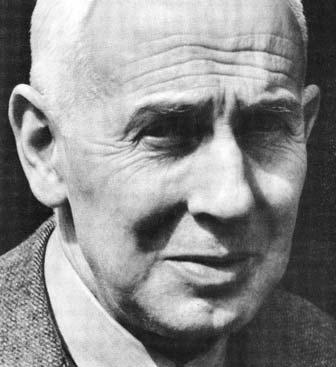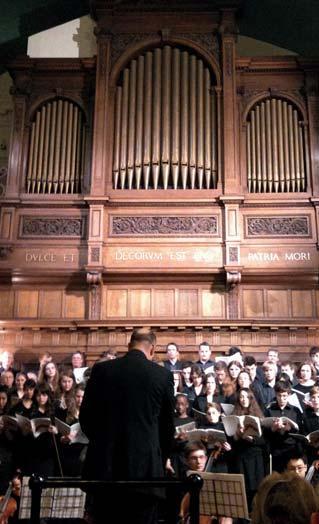
16 minute read
Obituaries
from ONA 86
Sir Derek Wanless (59-66) Born 1947, died 22 May 2012, aged 64.
Hardly a quiet boy, Derek would groan like the rest of us when master ‘LM’ was announced at the annual timetable reading. He would laugh, as well as master Joe Liddell, when a boy inverted his dinner over the head of another in ‘his’ place. He was suitably cowed when the fearsome Billy Boll sat in for the timid Mr Macro for one maths lesson. Humour he would have needed in plenty when inquisitioned by the chairman of the Treasury Select Committee who refused to recognise the ‘Sir’, and in dealings with the dour Gordon Brown.
Advertisement
His joviality never extended to the swimming baths though, where he was to be found shivering in the shallow end. In a different deep end, he towered over NatWest Bank as Chief Executive, with Chairman Lord Alexander, akin to John Hall and KK in their heyday.
Blessed with a magnificent intellect, he was the local boy made very good, but never deserted his roots suffering, in common with fellow Geordies, at St James’ Park over many years. He was born in the West End in 1947 in humble surroundings and sponsored by Westminster Bank to the RGS, entering at the senior school level. He was the guy to whom the head of maths, Frank Budden, referred when proof reading for his book. Derek was a mean school chess player too.
Derek was faithful to his sponsors and gained experience in the bank during holidays. Sixth Form was inevitably followed by King’s College, Cambridge and then Harvard. Returning to the bank he was catapulted through the ranks, homing in on London. By now he was married to Vera, a local girl who he met at the Oxford Galleries, and remained so to her for the rest of his life. The trappings of the job included a fine panelled office in Lothbury, City of London, a Jaguar with chauffeur and a family of five children. ‘How did you manage your job with twins?’ – ‘like a zombie’ he said. After leaving his job with NatWest he found himself in demand by Gordon, resulting in the Wanless Report on the NHS. ‘The NHS have received x billions, but have no idea where they spent it’, he said to me. This Report was followed by a second analysis four years later Securing Good Care for Older People. He may not have had this incorporated into an Act of Parliament, but he did provide an early warning on provision for all of us who choose to live longer and yet put less aside for their care.
Locally he was much, well too much really, involved in the Northern Rock but later, as chairman of Northumbrian Water, helped end the business career on a good note. Derek was credited a full page obituary in The Times on 31 May 2012, having prematurely been taken away from us by pancreatic cancer on 22 May, aged only 64.
Melvyn Wallhead (56-66)
Laurence Shurman (38-50) Born 1930, died 27 July 2012, aged 81.
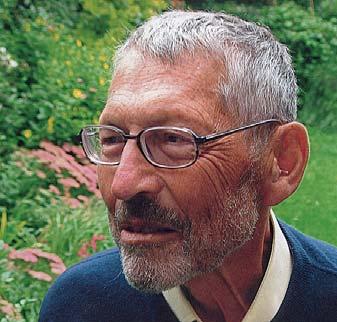
Old Novos will be sorry to hear that Laurence Shurman died in July this year.
Laurence made a distinguished contribution to British public life through his leading role in the development of the Ombudsman service as a means of securing wider access to justice for ordinary people. He was Banking Ombudsman from 1988 to 1996. He helped to found what is now the British and Irish Ombudsman Association (BIOA) and became its first Chair from 1991 to 1999, encouraging the development of the role and taking the lead in establishing how it should be carried out. He continued to be fully involved in BIOA after his time as Chair. He was also an active member of JUSTICE, the all-party law reform and human rights organisation. He was a Governor of the RGS from June 1991 to November 2000.
Laurence’s forebears were among the many Jewish families who fled the Russian pogroms of the late Nineteenth Century and set about making their way in British society. He was born in 1930 and joined the junior school of the RGS in 1938. He often commented on the total absence of anti-Semitism in the school, and coped perfectly well during the evacuation to Penrith in a billet run by a couple of Methodist ladies. He contributed to and enjoyed a wide range of school activities, and did a great deal of walking in the Lakes and Cheviots. Along the way he made friends who lasted a lifetime, among them a remarkable generation of RGS lawyers which included Geoffrey Bindman (45- 50), Humphrey Potts (44-50), Jim Stephenson (44- 51) and Peter Taylor (38-49). He made many friends later in life, but he once said to me that old friends were the best because the depth of shared experiences gave them solidity.
Laurence won an Exhibition to Magdalen College Oxford, where he read law and rowed in the First Eight. After moving to London he was fortunate in making an exceptionally happy marriage to a Mary, an American teacher of English. She was not Jewish –I once asked him if his parents did not find this difficult. He replied that they did but that her parents found it great deal more difficult.
Establishing a solicitor’s practice in London was not easy –he had unfortunately lost the sight of one eye and had a wife and three children to support. But he won through. He came to enjoy a very happy family life and a wide range of friendships from the twin bases of his house in Highgate and lovely cottage in Suffolk.
However, Laurence would not have been fully satisfied simply to make a good living for himself and his family, respectable aims though those are. He told me he had started in law simply to earn a decent income, but as time went on his respect and understanding of the law had deepened. With his move to the Ombudsmanship at the age of 58 he came into his own. It gave him the opportunity to play an important part in improving the quality of justice for all. People should be dealt with fairly by government and other large organisations such as banks and insurance companies. Sometimes redress for unfair treatment could be obtained through the courts, but often litigation was unaffordable or no remedy was available –the Ombudsman role filled this gap and was free.
His growing involvement in public service no doubt had many causes. But one of them will have been the standards and ideals of the RGS of his day, forcefully promulgated by a great Headmaster, E.R.Thomas.
In his first report as Banking Ombudsman his trenchant criticisms were picked up by the newspapers and led to much dissatisfaction on the part of the banks themselves, but he stood his ground, thus probably surprising them with the power which his exceptional integrity, strength of character and potency in argument brought to his dealings with others. Over time he was able to win their trust by establishing his own fair mindedness and impartiality. Laurence was a wide and enthusiastic reader –one of his last aims in advocacy was to persuade his friends to join him in his admiration for Stefan Zweig. All in all, Laurence came across, particularly in his later years, as an exceptionally fulfilled and happy man.
I first met Laurence in 1938 in J1b, the lowest form in the school. We were painting our models of a prehistoric village when I felt something odd on the back of my head. I reached behind me with a hand and brought it back covered in green paint. I turned to see Laurence behind me wearing a broad grin. Seventy four years later and just a few days before he died the two of us met for what we both knew would be the last time. I reminded him that shortly before his terminal illness was diagnosed he had managed to climb Helvelyn again. He said that yes, he had, though he was probably the last person to get to the top that day and certainly the last to get down. At which he gave a big, brave, whole-hearted grin. That characteristic grin had remained essentially unchanged over the years. So the wheel came full circle.
David Boll (38-49)
John Porritt (RGS maths teacher 79-93)
Born 1933, died 2012.
John Porrit was a member of the RGS Mathematics team between 1979 and 1993. He will be remembered for his considerable contribution to its academic spine.
John studied Mathematics and Philosophy at Cambridge. Those were still the days of national service, but, as he had already developed his convictions sufficiently, he did his as a conscientious objector. That took him to Vienna for a year, where he worked with refugees from the Hungarian uprising in 1956. His teaching career in Mathematics began with a stint at Rickmansworth Grammar School. There he rubbed shoulders with Frank Budden who shortly was to be appointed Head of Maths at RGS. It was also at that time that he met his future wife, Heather. John decided that he aspired to a degree in full-honours Mathematics so he completed a BSc (London) by studying part-time. That wish to be a thoroughbred in the subject later flowered in aspiration to do research (in differential geometry, under Tom Wilmore, then a governor at RGS) when he later moved to Durham; he achieved an MSc for his work on Riemannian manifolds.
After his work at Rickmansworth, John moved to Penang in Malaysia, where he worked from 1963 to 1966 on the training of teachers. In 1966, he was appointed to Bede College, Durham, to continue in that work. It is no surprise that he was seconded in 1971 to do two years at the University of the South Pacific. His lengthy service at Bede came to a premature close in 1979 with the upheavals which followed the incorporation of Bede into the University
of Durham. John was made redundant, but given his previous acquaintance with Frank Budden, he took the opportunity to join the Mathematics team at RGS, where his academic background and aspiration to thoroughbred excellence fitted naturally with the outlook of the department. His approach to the subject was thoroughly rigorous, and he delighted in its logic and clarity.
During his RGS years John turned to involvement with the Open University (from where another long-standing colleague, Pauline Perella, was recruited on John’s strong recommendation). That same style was brought to bear on M336 Groups and Geometry. In due course when John retired I took over the same role and knew that I had an exemplary act to follow.
John also readily responded to the challenge of the weaker RGS students. I remember doing some teamwork with him on a pair of sets of Form 5 (Year 11) doing O-level. That entailed alternate weeks of work on a past paper –again that clarity and focus, but this time suitable amplified for the lesser intellects. At the back and watching, I was often party to the odd bits of repartee to which John was quite oblivious but which suitably reflected the atmosphere of the occasion! He also devoted time and enthusiasm both to RE and to the Christian Union. His religious convictions were not overt in Mathematics but could not be missed by anyone who became more than an acquaintance. Another of his interests was bridge, something to which he would devote much time in retirement. He started the RGS Bridge Club and it was soon making regular competitive visits to other schools. After RGS, life did not stop. He left at 60 to assume more responsibility with the OU. He continued until forced to retire fully on age grounds at 70. By then he had moved to Riding Mill where he took full advantage of his new surroundings –gardening, church work and bridge gave him retirement fulfilment, as well as the opportunity to develop his gifts as a linguist and to tutor the odd student. Among his recent accomplishments are the long-distance walks, St Cuthbert’s Way and the Bede Way, in 2010. Sadly his end came with a battle with cancer and he died in May this year. During that final period he would ring me up from time to time, still his old combative self, but by then dialogue was becoming difficult for him. His funeral was what he would have wished –in St Aidan’s United Reformed Church, Hexham, with many of his family, friends and colleagues present. I shall remember him as an old-fashioned grammar school teacher, worthy of the calling, but with a forward-looking and reforming streak which made him a bracing person to know, both as a colleague and a friend. Our condolences go to his widow, Heather, and his children Siobhan, Juliet and Stephen.
Peter Mitchell (RGS Maths Teacher 1980-2003)
Raymond Dixon Peacock (38-45)
Born 1927, died 15 March 2012, aged 84.
Ray was was evacuated to Penrith between 1939 and 1944, and consequently had only two years schooling at Eskdale Terrace, one before, and one after, the Second World War. He was a cross country runner rather than a rugby player, and a member of the school team for two years. He was also one of those who kept the school chess club alive in Penrith, and together with ‘Bobby’ Walker and his twin brother Douglas produced a short-lived (one part) of a Removes rival to the school magazine the ‘Novo’, entitled the ‘Rovo’. How this got through the school bureaucracy to the printing stage remains a mystery, but there were no repercussions
from the Headmaster, Mr Thomas. After obtaining an honours degree at King’s College, Newcastle in 1948, his PhD studies took him into fluorine chemistry. Fluorine is a dangerous gas which was then of little practical application, but known to be crucial in the understanding of some aspects of science. He continued his studies of fluorine compounds at Imperial College, London, where in 1953 he was appointed Assistant Lecturer and later Lecturer. After a period at Birmingham University where he followed through his interests in fluorine compounds and the noble gases, he was appointed to the Chair of Inorganic Chemistry at Leicester University. In contrast to many in academia, he treated his research students as equals, His friendships consequently became worldwide, with visits to India, Australia and California to pursue his research. He was twice Head of Chemistry and twice Pro-Vice Chancellor of the University.
Ray was a keen gardener, walker and cyclist, and entered many races while at Leicester. He also cycled from Land’s End to John o’ Groats to raise money for his church. He was proud to be labelled ‘the cycling professor’ both at Leicester and while doing a stint at Berkeley University, California in the early 1970’s. In retirement near Oxford he took a great interest in place names, and started learning Welsh to gain greater insight. He was elected an ‘Honorary Welshman’, being the only Englishman in the class. Though in voluntary exile for many years ‘down south’, he retained an interest in things Northumbrian, from the names
He is survived by his wife, Dorine, who was a great support in his last illness (a return of prostate cancer), by his children (Malcolm, Helen and Duncan), and by three grandchildren (Joanna, Ben, and Oliver).
Douglas Peacock (38-45) and Neil Peacock (42-48)
Alexander Simpson Fotheringham (50-58)
Born 1940, died June 2012, aged 72.
Alex Fotheringham was born in Earsdon and after a successful schooling at the RGS moved to Cambridge to read English at King’s College. Whilst at the School he enjoyed an enviable reputation as a cross country runner.
After graduation, he eventually became a schoolmaster at King’s School, Bruton, in Somerset. He was always something of a bibliophile and frequently had a stand at various provincial booksellers fairs. In due course he decided to become a full time antiquarian bookseller and joined Marlborough Rare Books in New Bond Street, London and where he was subsequently made a director. As well as travelling extensively on buying expeditions, he was also closely involved in the administration of the business; in particular he prepared and monitored the budgets.
Although I had come across Alex whilst at School, I got to know him well after I moved to London. Over the years I had built up a small collection of the works of Thomas Bewick, the Tyneside engraver. Alex went to great pains in helping to develop this collection and many gems were added to it following several of his overseas visits. We met regularly and I very much enjoyed his company. However we saw less of each other following my retirement and his leaving Marlborough Rare Books, to set up his own business in the North East.
I recall that Alex had a penchant for acquiring properties in wild areas. For some years he had had a cottage in one of the valleys at the north end of the Howgill Fells; he also acquired a roofless croft on the Isle of Muck in the Hebrides which he saw as a long term restoration project. Upon returning to the North East, he settled in a small cottage at the end of the road at East Chesterhope, near Ridsdale in Northumberland. From here he developed a very successful antiquarian business and issued regular catalogues. One of the last deals he concluded before his death involved a 1709 manuscript catalogue of the School library, which has now happily been secured for the School archives.
I will miss him and our wide ranging discussions, latterly on the telephone.
Christopher Dean (45-53)
William Michael Poulton
(50-56) born 1939, died 8 February 2012, aged 73.
Betty Nichols
(widow of Colin Nichols, Second Master 67-86) died 21 March 2012, aged 87.
Austen Buckle Miller
(36-46) born 1929, died 10 April 2012, aged 83.
John Norman Adams (49-57) born 1939, died 14 April 2012, aged 72.
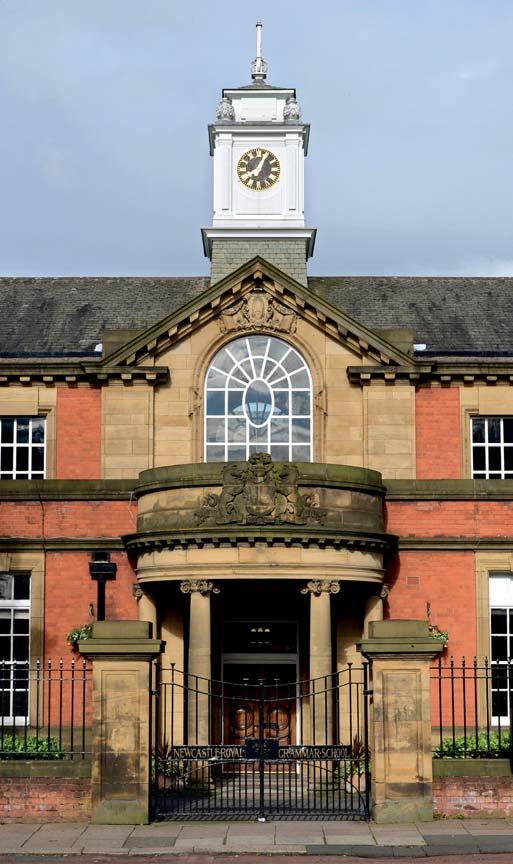
David Cleminson
(44-51) born 1932, died 16 April 2012, aged 80.
Geoffrey Ord
(44-49) born 1933 died 20 April 2012 aged 79.
Alfred Raymond Holt
(24-29) born 1912, died 3 May 2012, aged 99.
Peter Horrocks
(52-60) born 1940, died 8 July 2012, aged 71.
ONA Merchandise
Cufflinks £10 Enamelled cufflinks (presentation box included) Tie £10 Polyester tie, striped with crest.
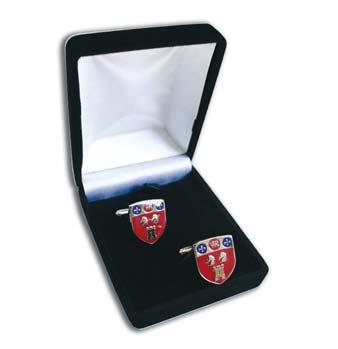
Polo Shirt £18 Canterbury polo shirt with embroidered crest. 100% cotton. Available in royal blue

Wall Plaque £25
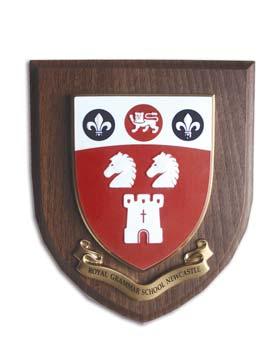
only, in sizes XL.

Hooded Sweatshirt £35 Canterbury hooded sweatshirt with embroidered crest. 60% cotton 40% polyester. Available in grey only, in sizes M and XL.

ONA merchandise is now for sale
To order any of the items, please send a cheque (payable to ONA) to:
ONA Office Royal Grammar School Eskdale Terrace Newcastle upon Tyne NE2 4DX
Remember to include your name, address, phone number and/or email, and to indicate which item you are ordering.
Please include phone number and/or likely to be delayed. The ONA accepts no responsibility for non-delivery via standard post. If you would like your order to be sent by special delivery, please contact the ONA office for
email so we can contact you if delivery is a price list.



